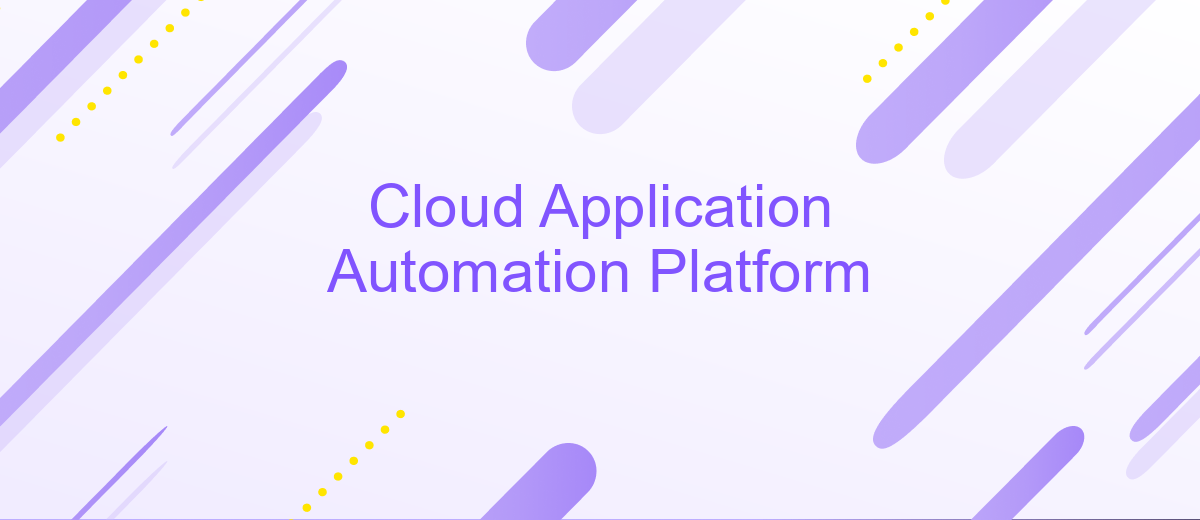Cloud Application Automation Platform
In today's fast-paced digital landscape, businesses are increasingly turning to cloud application automation platforms to streamline operations and enhance productivity. These platforms offer a seamless way to manage, deploy, and scale applications across diverse cloud environments. By automating routine tasks and processes, companies can reduce manual errors, optimize resource usage, and accelerate their time-to-market, ultimately driving innovation and competitive advantage.
Introduction to Cloud Application Automation Platforms
Cloud Application Automation Platforms are transforming the way businesses manage and deploy their applications. These platforms provide a comprehensive suite of tools that streamline the development, deployment, and management processes, enabling organizations to focus on innovation rather than infrastructure. By automating routine tasks, these platforms reduce the complexity and time required to manage cloud environments, thus enhancing operational efficiency and scalability.
- Automated deployment and scaling of applications
- Centralized management of cloud resources
- Seamless integration with existing IT infrastructure
- Enhanced security and compliance features
- Cost optimization through resource management
As businesses increasingly adopt cloud technologies, the demand for robust automation solutions continues to grow. Cloud Application Automation Platforms cater to this need by offering a flexible and scalable approach to cloud management. They empower organizations to quickly adapt to changing market conditions and technological advancements while ensuring optimal performance and cost-effectiveness. By leveraging these platforms, businesses can achieve greater agility, reduce operational overhead, and drive innovation in their cloud strategies.
Key Features and Benefits

Our Cloud Application Automation Platform offers seamless integration with a wide range of applications, streamlining your workflow and enhancing productivity. By leveraging advanced automation capabilities, users can effortlessly manage and orchestrate complex processes, reducing manual intervention and minimizing errors. The platform's intuitive interface ensures that both technical and non-technical users can easily design and deploy automation workflows, making it an ideal solution for diverse business needs.
One of the key benefits of our platform is its compatibility with ApiX-Drive, a powerful integration service that simplifies the connection between various applications. This feature allows users to automate data transfer and synchronization across multiple platforms, ensuring real-time updates and consistency. Additionally, the platform is highly scalable, supporting businesses as they grow and evolve. With robust security measures in place, users can trust that their data is protected, allowing them to focus on innovation and efficiency. Overall, our Cloud Application Automation Platform empowers businesses to optimize operations and achieve their goals more effectively.
Use Cases and Examples

Cloud Application Automation Platforms have become essential for businesses looking to streamline operations and enhance scalability. These platforms enable seamless deployment, management, and optimization of cloud-based applications, ensuring efficiency and cost-effectiveness. Organizations across various industries leverage these platforms to automate repetitive tasks, reduce manual intervention, and improve the overall performance of their cloud environments.
- Retail companies utilize automation platforms to manage inventory systems, ensuring real-time updates and efficient stock management.
- Financial services firms employ these platforms to automate compliance checks and data processing, enhancing security and accuracy.
- Healthcare providers integrate automation to streamline patient data management and improve care coordination.
- Manufacturing enterprises use automation to monitor production lines, optimizing resource allocation and minimizing downtime.
In conclusion, Cloud Application Automation Platforms offer versatile solutions tailored to industry-specific needs. By automating routine processes and enhancing application management, these platforms enable businesses to focus on innovation and strategic growth. As cloud technology continues to evolve, the adoption of automation platforms is expected to rise, further driving efficiency and competitiveness in the digital landscape.
Choosing the Right Platform

When selecting a cloud application automation platform, it's crucial to consider several factors that align with your organization's needs and goals. The right platform can streamline operations, enhance productivity, and provide scalability. Begin by assessing your current infrastructure and identifying specific requirements that the platform must fulfill.
Next, evaluate the integration capabilities of the platform. It should seamlessly connect with your existing tools and systems to ensure a smooth workflow. Additionally, consider the platform's user-friendliness and the level of technical expertise required for its operation. A platform that offers intuitive interfaces and comprehensive support can significantly reduce the learning curve for your team.
- Scalability and flexibility to adapt to changing business needs
- Robust security features to protect sensitive data
- Cost-effectiveness and transparent pricing models
- Strong vendor support and community resources
Finally, conduct a thorough comparison of potential platforms by reviewing case studies and customer testimonials. This can provide valuable insights into the platform's real-world performance and reliability. By taking these steps, you can confidently choose a cloud application automation platform that best supports your business objectives.
- Automate the work of an online store or landing
- Empower through integration
- Don't spend money on programmers and integrators
- Save time by automating routine tasks
Future Trends in Cloud Application Automation
The future of cloud application automation is poised to be shaped by several emerging trends. As businesses increasingly adopt multi-cloud strategies, the demand for seamless integration and interoperability will grow. Tools like ApiX-Drive will play a crucial role in automating these integrations, allowing companies to connect disparate cloud services effortlessly. Additionally, the rise of artificial intelligence and machine learning will enhance automation capabilities, enabling predictive analytics and self-healing applications that can optimize performance and reduce downtime.
Another significant trend is the shift towards serverless architectures, which will drive the need for more sophisticated automation platforms that can manage ephemeral resources efficiently. Security will also be a top priority, with automation platforms incorporating advanced security measures to protect data across various cloud environments. Furthermore, as edge computing gains traction, automation solutions will need to adapt to manage distributed resources effectively. These trends indicate a future where cloud application automation not only simplifies operations but also drives innovation and agility across industries.
FAQ
What is a Cloud Application Automation Platform?
How does cloud application automation benefit businesses?
Can I integrate multiple applications using a Cloud Application Automation Platform?
What kind of tasks can be automated using a Cloud Application Automation Platform?
Is it difficult to set up automation between cloud applications?
Apix-Drive will help optimize business processes, save you from a lot of routine tasks and unnecessary costs for automation, attracting additional specialists. Try setting up a free test connection with ApiX-Drive and see for yourself. Now you have to think about where to invest the freed time and money!


